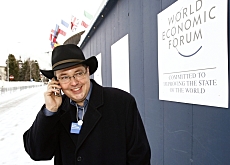
WEF ends on an optimistic note

André Schneider, managing director of the World Economic Forum (WEF), tells swissinfo that the meeting has ended positively and with hopes for progress.
He says the most important developments were that climate change was widely discussed and that the Israelis and Palestinians said they wanted to talk.
The five-day WEF, which was being held in the Swiss resort of Davos, ended on Sunday. It gathered many leading figures from the business and political world.
In all, around 17 sessions were devoted to the environment, said the WEF.
Israeli Foreign Minister Tzipi Livni and Palestinian President Mahmoud Abbas were among the political heavyweights at the forum. They pledged to forge peace during their speeches and held a meeting on the sidelines of the event.
World trade also received a boost. On Saturday, a Swiss-organised ministerial meeting of around 30 countries on resuming world trade talks resulted in “a strong wish for the quick resumption” of negotiations. But no timetable has been set.
swissinfo: How did the 2007 WEF go?
André Schneider: First of all, there was a large increase in participants, with an exceptional group of CEOs and an excellent group from the political world and civil society.
The important discussions on climate change have to be underlined, as well as the discussions on peace in the Middle East.
Lots of exchanges took place on the future of Iraq. There were also discussions on Israel and the Palestinian territories, which included civil society. In this regard, things started to move.
As for the World Trade Organization, we now hope that a new impulse will be found to [help] conclude the Doha round [on world trade].
swissinfo: There were great hopes over the Middle East dossier. But there was no concrete result. A disappointment?
A.S.: I don’t quite know who had these great hopes because the present situation could not be worse. Now what we need to do is restore discussion between the parties [involved] and I think this was done.
Our contribution was also to show them to what extent civil society on both sides was fed up and wanted the situation to improve. I think we succeeded in giving [the discussion] a new direction.
swissinfo: Decision-makers talked a lot about the climate and the environment. Is the WEF a useful platform?
A.S.: Our main role is to keep the discussion and the subject on everyone’s minds. We are also becoming a platform for companies to unveil their activities.
DHL is presenting a solution which makes sure environment is not affected when packages are sent. Coca-Cola, with the support of [environmental group] Greenpeace, is developing a new fridge which uses a lot less energy, which means the CO2 impact is much reduced.
The fact that solutions are unveiled here proves to other entrepreneurs that it is possible to be innovative in the sector in a way that is also very profitable economically.
swissinfo: The Israeli foreign minister has invited the WEF to hold its 2008 meeting in Jerusalem. Will you go?
A.S.: This would be for us the culmination of the peace process – when peace has been made and the way is cleared we will go to Israel and the Palestinian territories.
We can envisage a Middle East meeting taking place there, not a large global geopolitical one. The only topics would be the Middle East – peace and the future.
We could see this meeting not only taking place in Jerusalem, but also probably in Bethlehem and perhaps in Ramallah, crucial places for the different parties who must now make peace.
swissinfo-interview: Pierre-François Besson in Davos
The 2007 WEF summit took place from January 24 to 28.
There were some 2,400 participants, including 24 heads of states, 85 ministers and top business leaders, and more than 400 researchers and representatives of civil society.
The WEF and non-governmental organisations organised a sideline event called Open Forum Davos.
At the same time critics of globalisation staged an event called the Public Eye on Davos.
On Saturday the Swiss organised a meeting on the sidelines of the WEF on world trade, which resulted in hopes that negotiations could be restarted.
Switzerland and its fellow European Free Trade Association (Efta) members signed a free trade agreement with Egypt.
Bilateral discussions took place with Germany, the Palestinian Authority, Mexico, Indonesia and New Zealand.
Economics Minister Doris Leuthard met Bill Gates, the founder of Microsoft, to talk about e-government and innovation.
There were anti-WEF demonstrations on Saturday, with more than 1,000 people in Basel and around 200 people in Davos, taking part. They were mostly peaceful.

In compliance with the JTI standards
More: SWI swissinfo.ch certified by the Journalism Trust Initiative
















![The four-metre-long painting "Sonntag der Bergbauern" [Sunday of the Mountain Farmers, 1923-24/26] had to be removed by a crane from the German Chancellery in Berlin for the exhibition in Bern.](https://www.swissinfo.ch/content/wp-content/uploads/sites/13/2025/12/01_Pressebild_KirchnerxKirchner.jpg?ver=bb19e376)














You can find an overview of ongoing debates with our journalists here . Please join us!
If you want to start a conversation about a topic raised in this article or want to report factual errors, email us at english@swissinfo.ch.